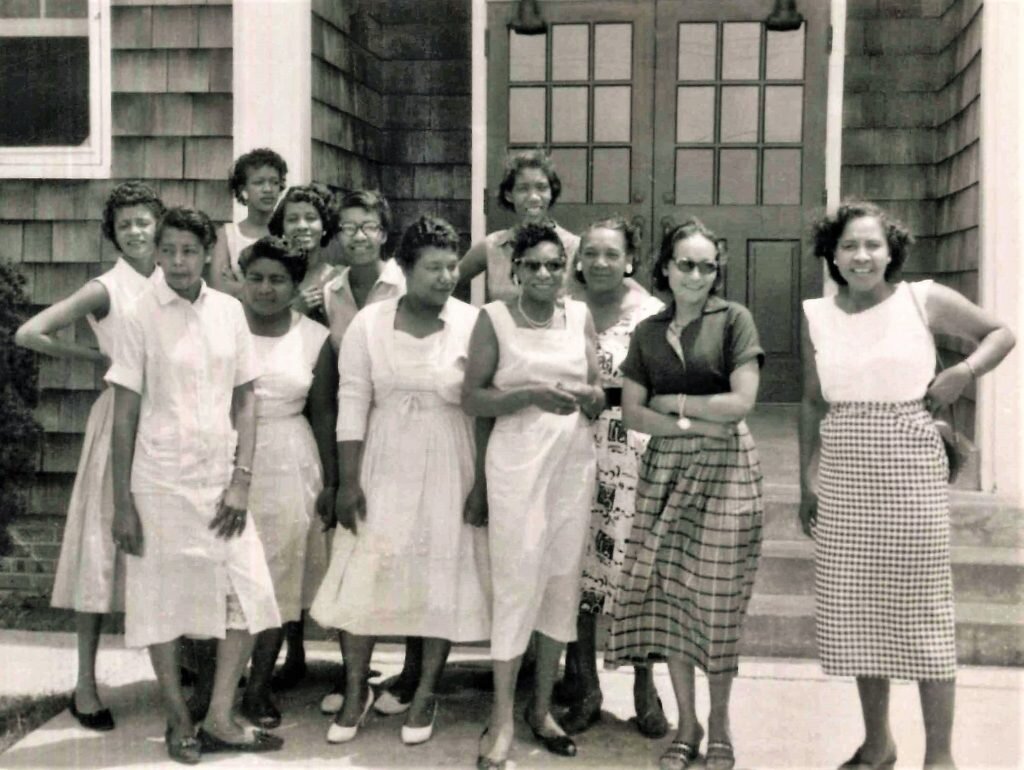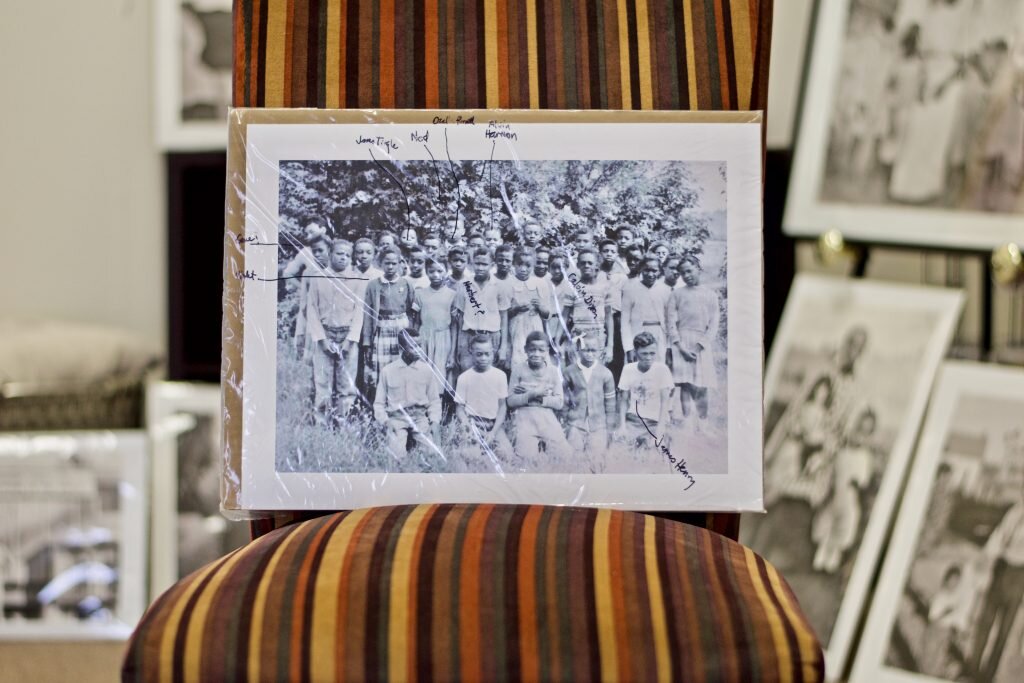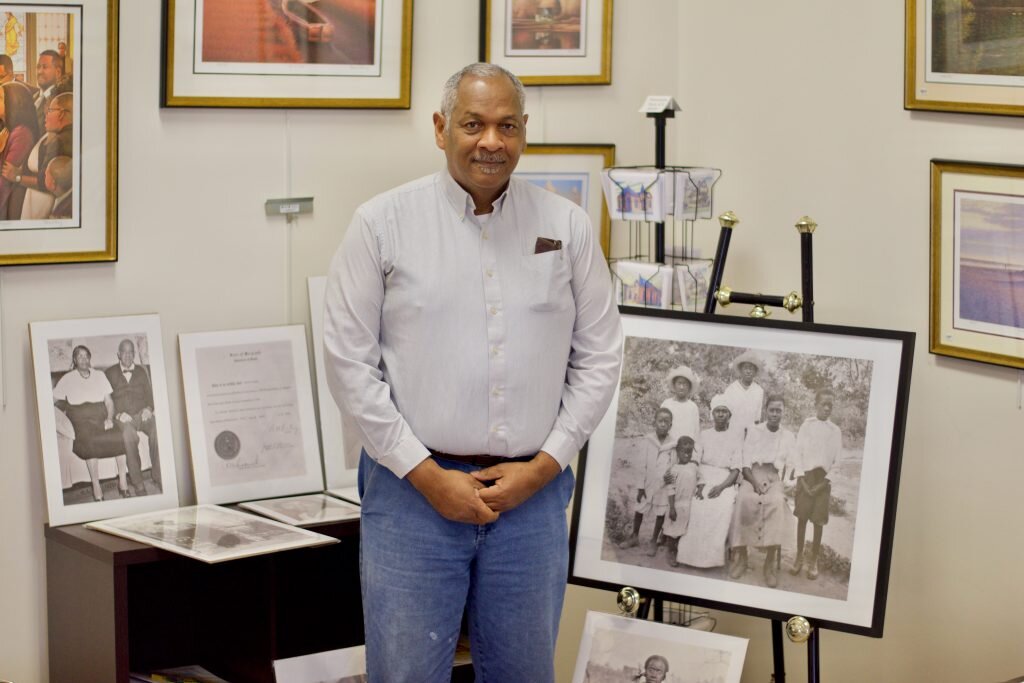
PHOTO COURTESY PATRICK HENRY
Teachers outside of the Flower Street School in Berlin, circa 1958, pose for a photo. The image is one of dozens collected and painstakingly restored by local artist Patrick Henry for an upcoming interactive reception at the Germantown School Community Heritage Center, Feb. 9.

JOSH DAVIS/BAYSIDE GAZETTE
Guests at a Feb. 9 reception at the Germantown School Community Heritage Center are invited to write on protective sleeves over each photo, helping to identify family and friends.

JOSH DAVIS/BAYSIDE GAZETTE
Berlin artist Patrick Henry for several months has worked to a restore a massive collection of photos from the 1800s to the middle of the last century that depict local African-American history. The images will be used in an interactive exhibition next month at the Germantown School.
By Josh Davis, Associate Editor
(Jan. 24, 2019) Visitors to the Germantown Community Heritage Center next month will be greeted by local faces from the past — many familiar — in dozens of black and white photos taken between the mid-1800s and the middle of the last century.
They will see schoolteachers in front of familiar buildings and children clutching tattered toys, workers toiling in a canning factory and Buffalo Soldiers going off to war, weddings and graduations, and African-American families displaying strength and pride over the span of a century before the Civil Rights Movement.
Compiling the collection was a labor of love for Berlin artist Patrick Henry, who for several years painstakingly restored the photos. Images were found in the collections of Edward Hammond Sr., Maude Armstrong, John Briddell, Jesse Fassett, Jeanette Smith, Margaret Smith and Leola Smack.
Henry said the project perhaps began when his wife’s aunt, Maude Armstrong, passed away in 1998 at the age of 96.
“They were cleaning up the house and on the porch ready to be thrown out was a box of photos,” he said.
Later additions to the massive collection included an extensive visual family history gifted by Henry’s longtime friend Edward Hammond, who passed away in 2011, along with many photographs his mother-in-law, a former schoolteacher, had amassed of the local school system.
“It evolved from there and just kind of came together,” Henry said. “And it seems like now, more than ever, it’s important to bring this out to give people a sense of what was. It’s almost a whole different portrayal of African-American life that a lot of people aren’t privy to.”
The process of scanning and digitally restoring the photos was intensive, so much so that Henry said his shoulder, at one point, started to lock up.
“You have to click off scratches and the hazing of photographs, and I cleaned them up as much as possible,” he said. “I could easily have gone the route of seeking a grant or something like that [for the work], but I am so independent-minded that I didn’t want to be beholden to any entity.
“It’s been months and months,” Henry continued. “It started about three or four years ago when I decided I was going to learn to use my format printer and to learn the subtleties of tones and values and contrast – and tearing up a lot of paper.
“This was one of those passions that you don’t know why you do it, but you know you have to do it,” Henry said.
He recalled one photograph in particular that took so long to get right Henry would wake up in the middle of the night still thinking about it.
“It just didn’t hit the standard I wanted, so I’d come back and tear it up and work on the different visual components and reprint it — and this paper and ink is not cheap!” Henry said. “But I’m blown away with how it all turned out.”
Last Thursday night, Henry framed many of the finished images and then wrapped them in protective plastic sleeves. On Friday morning, he walked into his Henry Fine Arts studio on Old Ocean City Boulevard in Berlin and was struck by what he saw: so many faces and expressions, and each saying something different.
“Each picture tells a story and, within the picture, you have every person that has a story,” Henry said. “It’s just awesome to see it all come together.”
The project, which Henry is calling “African-American Life in Another View,” will be the subject of a reception at the Germantown School Community Heritage Center on 10223 Trappe Road in Berlin on Saturday, Feb. 9 from 4-8 p.m. The photos will remain on display throughout the month.
“What this is going to do is open all kinds of dialogs and interests,” he said. “And at that reception these will be displayed, I’ll have a PowerPoint presentation, and I’ll have booklets [of additional photographs]. I didn’t get to enlarge all the images, but I’m going to have notebooks with each different collection for people to scan through.
“And then, we’re going to have an interactive moment where I’m going to have markers and some of the people will be able to identify people in the pictures,” he continued, explaining the protective plastic sleeves. “And then, all of this can be compiled in some kind of bigger digital or hard-copy form.”
The reception is free and open to the public. Henry said if anyone wishes to donate to the project, those funds would help pay for a permanent installation of some of the work at the Germantown School.
He hopes viewers will come away as moved and inspired by the display of African-American history depicted in the images, as he was.
“While I was working on these, I looked in the eyes of the people … and I saw, in spite of the social conditions they were in, there was an enormous pride,” Henry said. “There was a sense of, ‘I can rise up above this.’ And it is so powerful. A lot of times I wanted to cry.”
There are also many personal connections.
Among the photos are a series of Henry’s aunt during different periods throughout her life, starting at about age 12. Henry also found a midwifery certificate that belonged to Janie Tingle, dated March 23, 1939.
“She brought me into the world in 1952,” he said.
Leola Smack in one photo is pictured with a group of schoolteachers relaxing in a grassy field near the old Flower Street School. Smack was his second-grade teacher and Henry remembers the school principal, in particular, was “fire and brimstone.”
“That’s going to create a lot of energy, because what blew me away is I didn’t think teachers were capable of relaxing like that,” Henry said with a laugh. “You had a certain persona of them.”
He expects many others will find similar connections.
“It’s powerful. I feel that, somehow, I was entrusted with the mandate to put this together. Everything had to come together — I had to have the format printer, I had to have the scanner and the computer, and the time and the ability in between all the other stuff that I need to do in order to put this together.”
Henry said the collection could easily have been donated to Salisbury University for inclusion in their local history archives.
“But, I feel that it needs to be here [in Berlin],” he said. “And why not the Germantown School?”
